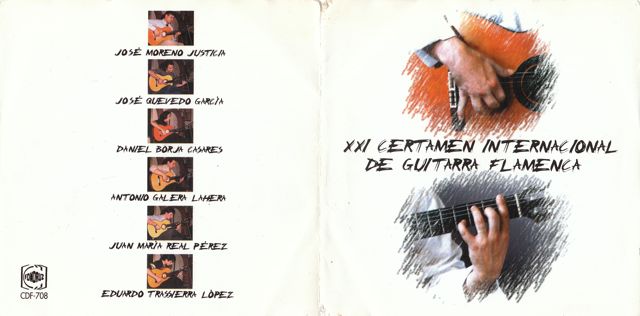|
NormanKliman -> Interview with Tomatito (Apr. 29 2010 11:26:11)
|
This was just published in El País (there shouldn't be copyright issues with the translation).
http://www.elpais.com/edigitales/entrevista.html?encuentro=6620&k=Tomatito
The questions are from the general public: anyone online who saw the invitation to send in questions, which was open for a few hours before they uploaded the answers. I didn't translate all the questions and the text below is a bit wooden, but it should give you a good idea.
I’ve heard a few jazz pieces that you recorded with Michel Camilo, and I think they’re excellent. Have you studied jazz, or do you use your experience as a flamenco and as a musician to improvise?
No, I haven’t studied jazz. I like it a lot, and I try to do things that I like, but being careful to keep it flamenco.
Could you tell us about some of your best memories of listening to cante? Siguiriyas or...
The best times were when I was accompanying Camarón de la Isla. Once, we went to an excellent fiesta with Fernanda... Lots of memories.
Which luthiers can you recommend? I already know about the ones in Madrid and I can’t afford their guitars.
In Almería, Juan Miguel González makes very good guitars.
Which classical guitarists have had the greatest influence on your career and on this recording in particular?
There are some excellent guitarists. Carles Trepat, from Catalonia, is among the best today.
Who do you think is better, Paco de Lucía, Sabicas or you?
Sabicas was a master in his day, with an excellent and very gypsy sound. Paco de Lucía was a revolutionary guitar player. Both are better.
How do you avoid repeating the harmonies that you use in your music? What other kind of folk music do you think goes well with flamenco?
By listening to other kinds of music. Any folk music with nice harmonies, to work that it into my music.
What do you think of the current state of flamenco?
It’s fine. Lots of young people are trying to come up with styles and new ideas, thanks to Camarón de la Isla and Paco de Lucía, so flamenco’s doing fine.
Don’t you think that young flamenco guitarists all sound the same? Which do you think are the most interesting, the ones we should be watching?
Things are taking shape now, and time will tell. What they should be worrying about now is playing flamenco with a lot of technique. You can’t play without technique!
There’s a lot of talk of regional tendencies in flamenco; different ways of singing and playing the guitar in one part of the country and another. What differences do you see between flamencos from Almería and those from Cádiz or Lebrija?
Well, there’s definitely something special about Cádiz, same story with Jerez and Lebrija, but there are always exceptions, like Sabicas from Pamplona and Carmen Amaya from Barcelona. Flamenco is universal.
I love hearing you with an orchestra, with a piano, with a flamenco singer, with anything! What’s your favorite style of flamenco? Besides Paco, what other flamenco guitarists do you admire?
I like bulerías the most, and I admire guitarists like Vicente Amigo, Niño Josele, Paquete, Josemi, Pepe Habichuela, etc.
Purism or innovation? Are all ideas valid in flamenco? Is duende a gypsy art or is it something that everyone can do (including the Japanese)?
Both. Without purism you can’t have innovation. Not all ideas are valid in flamenco, because the flamenco form of expression (flamencura) should never be lost, and because some ideas sound less flamenco than others. The balance is in gypsies and non-gypsies. If it weren’t for that balance, there wouldn’t be any flamenco, like don Antonio Chacón and Manolo Caracol, or Manuel Torres, or Niña de los Peines.
I’m a teacher. Is music something that can be learned or do you have to grow up with it? Any advice for kids who are interested in playing the guitar?
It’s something that reaches you on the inside, but you have to study it to become a good musician. I recommend that kids look at it as one of the good things in life. It takes a lot of hard work, but you have to look at it as something that’s fun to do. Music is for fun and for having a good time, not for suffering.
What are the most important things to be a good flamenco guitarist? What kind of idea does the rest of the world have of Almería?
Afición and discipline. People think that Almería’s a nice place, because there are good beaches, the food is good and the weather is good. What more could we ask for?
When you want a new guitar, do you usually place an order with a luthier or do you look for a finished guitar that fits your preferences? Which luthier do you go to first?
I’ve got a lot of guitars at home, and I usually play a Reyes. There are a number of good luthiers.
In your opinion, what are the three most important parts or styles of flamenco?
Seguidilla, soleá and bulería.
I’d like to know what you think about illegal downloads. What do you think about people downloading your music on the Internet? Do you think it’s a good thing for making music more popular or is it bad for the artists?
It’s bad for the recording industry, and we artists like it when people listen to us one way or another, but...
I’d like to know what you think about the current state of flamenco in Spain. Do you think things can continue, like in the origins of flamenco, or is pure flamenco a thing of the past?
No, in order to grow in flamenco you have to listen to lots of old flamenco, and anyone who tries to do it differently is like a house without a foundation.
|
|
|
|

